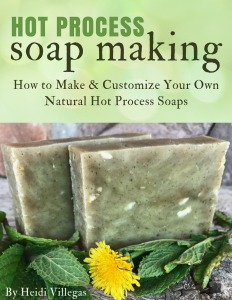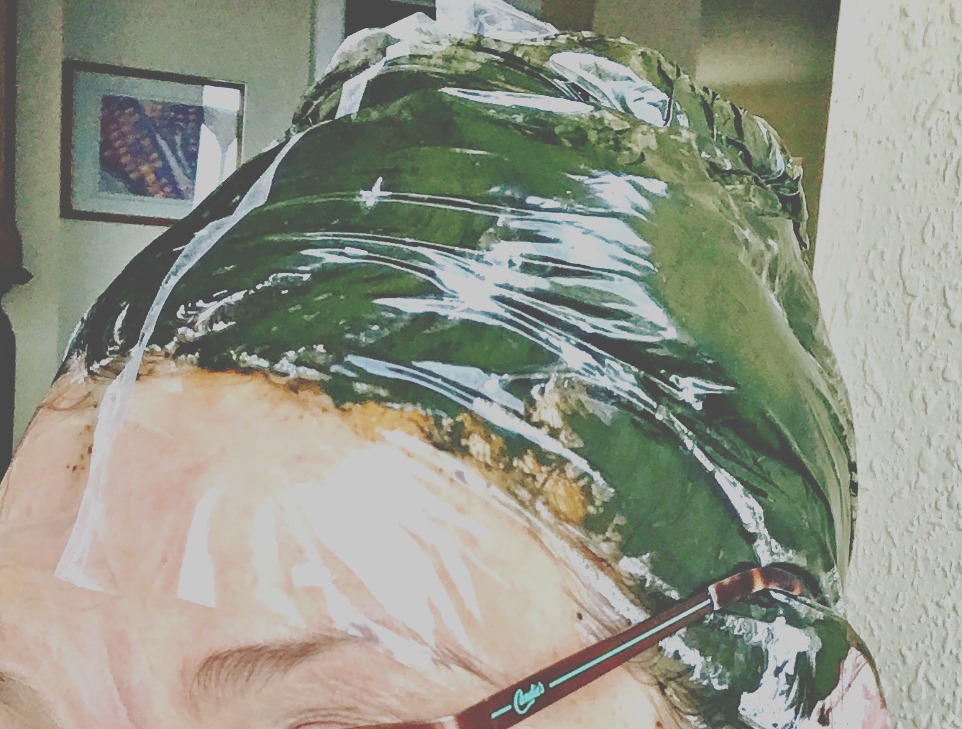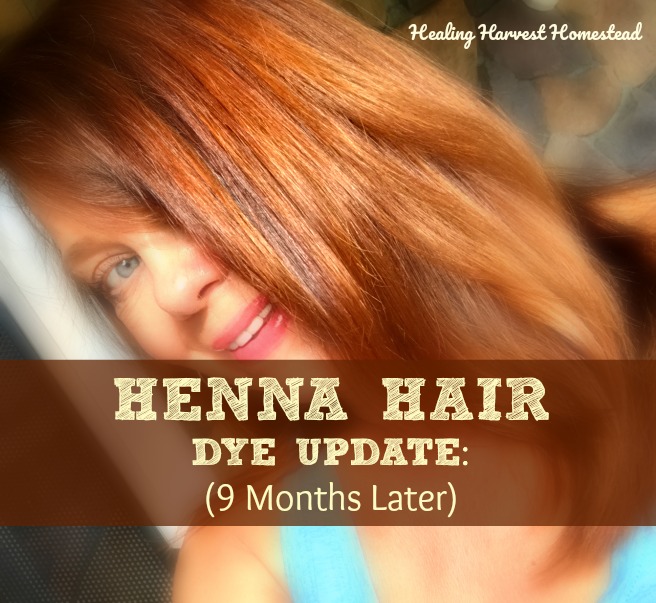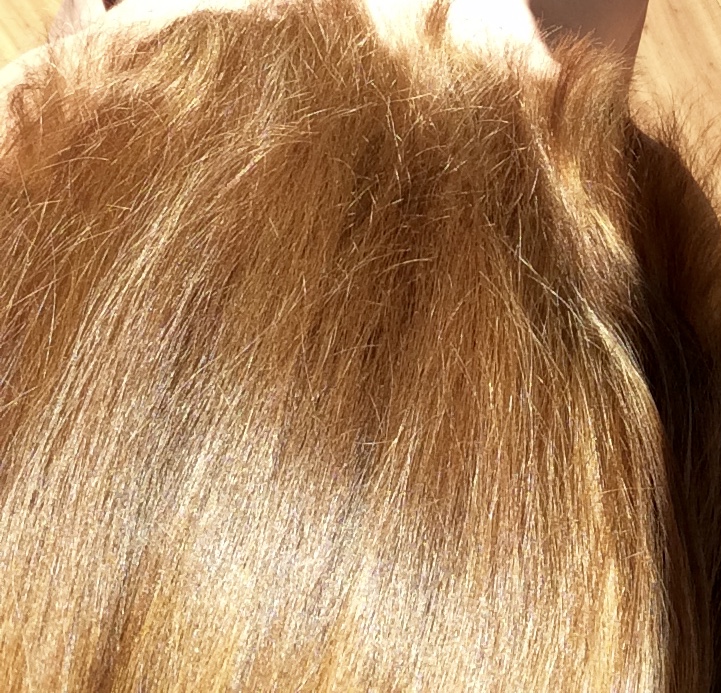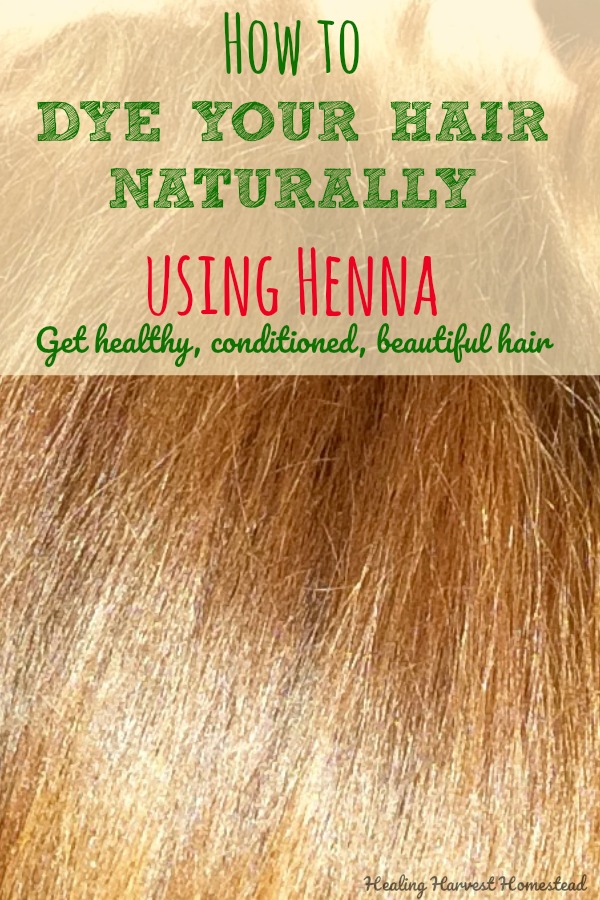How to Dye Your Hair Naturally with Henna (Plus, an Update About Henna Safety and Effectiveness)
The last time I whipped out my credit card to pay for an expensive chemical hair dye job was nearly a year ago. I got so sick of that yucky sinking feeling in my stomach....I couldn't believe how much those hair beauty trips cost! There was always a mixture of guilt about the cost, frustration that I felt like I had to even color my hair to begin with, and still that desire to look attractive in midlife. Plus, I really didn't like the fact that I was using dangerous chemicals on my scalp, near my brain!
At that time, I was still working in a professional career outside the home, and there were standards for our appearance. Now that I'm working from home, taking care of animals and gardens, and writing, my appearance is not critical. But still. I don't want my husband to walk through the door at the end of a long day at work and think, "Ugh," when he sees me. Right?
I started using henna about nine months ago, about eight weeks after that last pricey hair appointment. I just decided to go for it because I'd had it with spending that much money several times a year. I had heard henna is great for your hair, and I always thought the color was lovely. So...I tried it! Here's how the past few months using henna in my hair has worked out for me, plus some information about henna, in case you want to try it yourself!
Tired of paying lots of $$$ for chemical hair dye appointments that just damage your hair? Henna may be the answer for you! Here are the things you need to know about using henna as a hair dye: What is henna? Are there any negative side effects to using henna in your hair? What are the benefits of using henna? How do you dye your hair with henna? After nine months of using henna in my hair, here are my findings on using henna as a hair dye!
FTC Disclosure: There are affiliate links scattered throughout this article. If you click through and make any kind of purchase, I may receive a small commission at no extra charge to you.
What is Henna?
Henna is actually an herb. It comes from the plant, Lawsonia inermis, which grows in areas of the Middle East, Northern Africa, and India. It's been used topically for medicinal and cooling purposes, as a sunscreen, and for decorating the skin and dying hair for thousands of years.
These days, Henna has grown popular in the West for use as body decorations (henna tattoos) as well as use for hair dye. It seems to be growing in popularity for both uses, too!
There is some controversy about using henna in your hair, though. Some people believe that coloring your hair naturally with henna is actually bad for it. There have been cases where the henna has had some reactions with chemical colorants, and for this reason many hair dressers are taught to tell clients NEVER to use henna on their hair.
So....what is the real truth? I'm here to share my personal experiences using henna.
Are There Any Negative Side Effects from Using Henna as Hair Dye?
This is my opinion: NO.
I have to tell you, though, that my hair dresser freaked OUT when I told her I had dyed my hair with henna. She was furious with me. She told me she would NOT be able to color my hair under any circumstances until the strands dyed with henna completely grew out.
She explained to me that henna is damaging to the hair, dries it out, and can't be combined with chemical colors due to not being able to determine what the end result will be.
So, I did some research.
Here's what I found out:
The coloring agent in henna, lawsone, is what binds to proteins in the hair, creating a burgundy, red, or strawberry blond color, depending on the original hair color.
The danger in using henna products is that you need to be sure it's pure henna. Evidently, there is something called "black henna," which is basically henna (lawsonia inermis) combined with all kinds of horrible chemicals (coal tar, turpentine, acetone, lighter fluid, PPD, and other horrors).
That's what's bad. It's not the henna herb, it's the potential additives that are dangerous. Plus, PPD (p-Phenylenediamine) is a known toxin to our bodies. It happens to be in other commercial skin and hair products, too.
This is one of the things that makes me angry---The FDA wants to regulate a safe herb, like henna, because of the toxins some companies add to the henna. Why not make the actual toxic product illegal? Hmm??? Doesn't that make sense?
OK---no more ranting. Sorry about that. Some things will seriously just get me going.
If you are going for a darker color in your hair, and you want to use henna, you will need to use a product that is henna mixed with other natural herbs, such as indigo. That's the kind of product I use.
Thank goodness I'm a label reader because I felt pretty good about the choice I made, knowing pretty much nothing about henna before I started using it nine months ago. The only things in the henna I use is henna and indigo, both plants. I'm happy.
I decided on Light Mountain brand, because they have an excellent color chart and take pride in the fact they use only henna and indigo in varying amounts to create a variety of potential colors. I use the Mahogany color, and yes, it does have some indigo in it. I love it! They even have ways to cover gray hair. I haven't grayed (yet), but I'll be using this when I do.
OOPS! I forgot one negative. Some people may find the smell off-putting. I don't happen to be one of these people. To me, it smells herbal and earthy. I don't mind it at all. Plus, it's a small price to pay for gorgeous color, healthy hair, and its cost-effectiveness.
EDIT TO THE ORIGINAL ARTICLE: I thought I'd better mention one of my reader's experiences with henna, here in the negative section. She commented on the post, and for her, using henna was not something she would recommend. Henna is considered a semi-permanent dye, and for her, it turned out to be permanent. It was difficult for her to grow out her hair to her natural color.
Good to know! I appreciate my readers sharing, so I hope if you have experiences with henna or anything else I write, you will leave a comment! :-)
What are the Benefits of Using Henna in Your Hair?
Henna, in my opinion and experience, is a fabulous conditioner! After I use it, my hair is thicker and stronger. It remains this way for a few weeks, but as the henna wears out of the hair, I can tell a difference. It also makes your hair much more shiny. I think it's beautiful.
Here are other benefits:
- Henna makes your hair thicker and shinier, especially when used every four weeks or so.
- Henna improves the acid/alkaline balance of the scalp, and it discourages dandruff
- Henna actually protects each hair strand when it binds with the proteins in your hair.
- Henna helps lock in nutrients and moisture. (I can attest to the added moisture: It takes me longer to blow my hair dry, but I don't mind at all.)
- REAL henna products do not contain any chemicals, toxins, or ammonia.
- Henna is a natural conditioner.
- It costs WAY less than going to a hair dresser. I figured I save about $800 to $900 at least, a year by using henna.
If you're going natural, you might want to make your own soap! If so, my new eBook may be for you! It's available on Amazon Kindle too!
How Do You Dye Your Hair With Henna?
Using henna to dye your hair may feel a bit intimidating---it was for me. Mostly because I had a REALLY bad experience back when I was in college. I tried to dye my hair with those cheap chemical dyes like you find in Walmart, and my hair turned purple. And back then? NOT the best look.
Ever since then, I've never once dyed my own hair with anything. But like I said---I was sick of paying so much money AND having chemicals put on my head to boot. I am here to tell you, using henna is EASY.
(I am sharing the directions given by the Light Mountain brand, since that is all I'm familiar with.)
Here are the steps to using henna for coloring your hair naturally:
Step 1) Mix and Cure the Henna Powder
Using a non-metal bowl, mix up the henna and water into a paste, according to package directions.
You'll need to let this paste sit, covered, for one to three hours so it can cure. It will be stronger the longer you let it cure.
Note: Some henna/indigo mixtures don't need to cure as long or not at all.
Here is the henna/indigo powder mixture. I'm just pouring in the water now, and starting to get it mixed. NOTE the wooden spoon! Do NOT use metal when working with henna. It may react with the metals and change the color.
Step 2) Re-mix the Paste
After it's had time to cure, you will notice it has darkened up considerably, especially on the surface. This is due to oxidation. Just mix it up well. Now it's ready to go on your head!
Here is the cured paste. See how dark it got? Edited note: Light Mountain's Mahogany no longer requires curing. I'm not sure about the other colors though.
Step 3) Wash Your Hair
I usually get my hair washed while the paste is curing. That way, my hair is damp when it's done. Do NOT condition your hair before applying the henna paste. Conditioner will coat the strands, and you want your hair as porous as is natural for it to be to increase the henna binding to the strands.
Step 4) Massage the Henna into Your Hair
Be sure to wear gloves! Also, use a bit of salve or lotion around your hairline, ears, and back of neck because the henna may dye your skin. You don't want that!
Massage the henna paste into your hair. Put the plastic cap over your hair, and clip in the back with a plastic clip. NO metal!
(Good henna products' packaging comes with plastic gloves and the plastic to go over your head.)
You can use a heat source, like a blow dryer, to lightly heat up your hair--just be sure not to burn the plastic. I like to sit in a sunny window, or if it's winter, by the fireplace. The heat will help the dye work faster.
Got a bag over my head...
Step 5) Wait
The amount of time you have to leave the henna on your hair seems to vary depending on the source. I've had great luck leaving it on my hair for two to three hours.
Step 6) Rinse Out the Henna
Now it's time to rinse it out! Here's where I'll use conditioner to help wash it out. I like to make sure it's completely out of my hair, of course.
Step 7) Style and Enjoy!
Style as you normally would and enjoy your lovely locks!
Final Thoughts on Using Henna to Dye My Hair
When I first began using henna nine months ago, I wasn't sure how it would go. I had heard some things about how it damages your hair, dries it out, etc. Well, my experience has not been like this. In my own experience using henna/indigo, my hair is in much better shape, it seems to grow faster, and it styles better, especially right after using henna.
In writing this article, I am thinking I should do my henna treatments once a month instead of the usual six to eight weeks I've been going between treatments. I'm going to change that up! I'll get back to you if I notice any differences in treating my hair with henna more often!
What are your thoughts about using natural products vs. those that contain chemicals? Have you ever tried henna? I'd love to know if your experiences are similar to mine! Leave a comment in the comments section---I'll be replying! :-)
Hugs & Self-Reliance,
Heidi
P.S. If you haven't yet, sign up for our newsletter! You'll never miss a single thing, and you'll be getting two gifts from me when you do: An essential oil eBook, and another eBook on how to use herbs to relax and de-stress!
P.P.S. I don't know if you're interested, but here is the first article I wrote about using henna to dye my hair. I wrote it after my very first experience with using henna.
The final color---It's darker or lighter, depending on the sunlight. I get lots of compliments on my hair, and it's so much healthier and less expensive. LOVE!
Sources:
http://www.thefitindian.com/benefits-of-using-henna-for-a-healthy-hair/
https://www.truthinaging.com/review/henna-for-hair-is-it-safe
http://silknstone.com/About-Henna.html
Here's my hair with henna---Shiny and healthy looking.
Are you tired of paying big bucks to color your hair? You might want to give henna, a natural plant dye, a try! Here are the positives and negative things about using henna to color your hair naturally. Also, you'll find all the directions for using henna to color or dye your hair. Get healthy hair! Click through and find out if using henna is for you! #henna #naturalhair #haircolor


